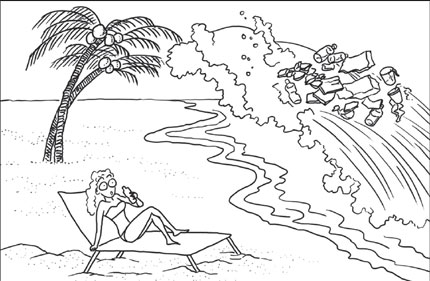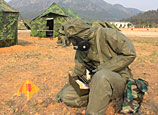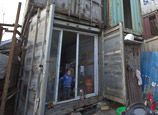
 |
| (Shanghai Daily) |
China's coastal areas are suffering from maritime pollution as scenic spots and local environments become increasingly threatened.
Two days of gales last week resulted in almost 60 tons of garbage ending up onshore at Silver Beach, dubbed China's No.1 beach, in the southern coastal city of Beihai in Guangxi Zhuang Autonomous Region.
Alongside natural debris such as seashells, seaweed and dead crabs, manmade rubbish dotted the site, turning Silver Beach into a land of garbage.
Plastic bags, beer bottles, shattered glass and bamboo sticks used for barbecues were piled up in the middle and eastern areas of the beach, driven there by southwestern monsoons.
But the 60 tons of rubbish is just part of a broader picture.
Last year alone, an estimated 1,800 tons of garbage was found on the beach, according to Yin Fengzhang, environment management director with the Management Office of Beihai Silver Beach Tourist Area.
Beihai, however, is a classic case of many Chinese coastal cities struggling with maritime pollution, said Chen Changrong, director of the Policy, Regulation and Planning Section of Beihai's Oceanic Administration Bureau, who boasts 25 years of experience on maritime issues.
He said that Beihai is located in the Beibu Gulf area, where large-scale industries are still in their start-up phase, and the maritime pollution the city faces is far from the worst among China's coastal cities.
The country's 2012 report on maritime environment quality shows that floating chunks of rubbish on supervised waters off the country's coastal cities averaged 17 pieces per kilometer in 2011, and the number more than doubled to 37 in 2012.
Meanwhile, the national average beach garbage density of coastal cities was 1,114kg per square kilometer in 2011, and jumped to 2,494kg per square kilometer last year.
Human garbage
According to China's 2012 report on maritime environment quality, 87 percent of garbage floating on the surface of the sea was a result of human behavior, and the rate reaches 94 percent when it comes to beaches.
Experts note that an obvious source of the garbage is tourists, who often leave litter, such as plastic bags, bottles and snack-boxes at seaside tourist destinations. On Silver Beach, for instance, tourists throw napkins away, largely ignoring the available garbage bins.
A trader at Silver Beach surnamed Su said that even during slack seasons, the beach is filled with rubbish from tourists and local residents.
Meanwhile, rain and rivers carry garbage into oceans, contributing to the increasing elements of nitrogen and phosphorus in the waters. "In the past few years, Silver Beach has turned into a big ?Green Beach' several times due to seaweed," said Yin Fengzhang.
Another source of pollution is garbage from residents, nearby hotels in coastal areas and oceangoing vessels, said Peng Zaiqing, director with Beihai's maritime management bureau.
Maritime garbage damages the marine eco-system, poses potential threats to sailing, and mars scenic sites, said Peng.
"Maritime garbage is constantly on the move, and is therefore likely to be spread around the world, which is why there is an urgent need for it to be curbed and treated," he said.
Curbing pollution
Peng suggested that government bodies enhance public awareness of marine environment protection, calling on radio and television to promote environmentally friendly behavior among the public.
"The State Oceanic Administration Bureau should publicize the maritime environment quality report on a regular basis so that the public realize the seriousness of marine pollution," he added.
Peng wants people who live on various ships and harbor vessels to clean up their act and stop dumping garbage in the water.
"Putting garbage in harbor areas and putting up posters to educate fisherman can be quite effective," he said.
Cleaning up marine pollution is complicated and difficult, involving coordination of various departments, as well as the public.
Peng suggested setting up a garbage-treating mechanism whereby various departments, cities or even provinces work together in supervising industries along inland rivers so that rubbish can be curbed at its source.
Latest development of H7N9 in China[Special]


















![]()
